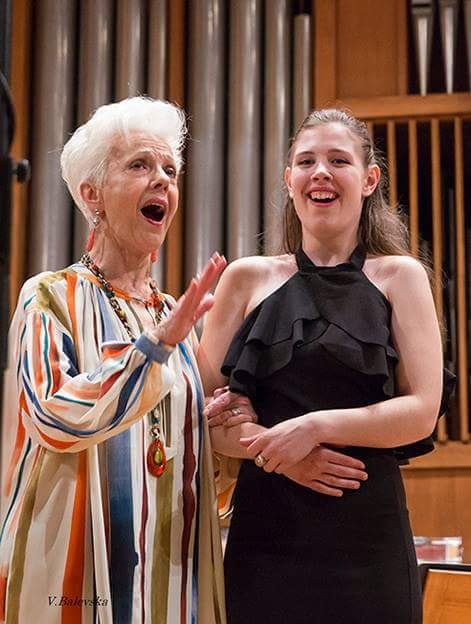Aleksandrina Mikhailova
"Success Requires Staying Loyal to Oneself"
Time to read: 5 min.For years rising opera star Alexandrina Mihaylova has captivated audiences across Bulgaria and Europe. Born in 1998 in Shumen, Bulgaria, she began her piano and opera singing studies at the School of Arts in her hometown at a young age. Nedka Telbizova was her first vocal coach. In 2016, Alexandrina caught the eye of Maestra Raina Kabaivanska, becoming the youngest participant in her International Masterclass. The following year, she joined another of the Maestra’s masterclasses, winning the Raina Kabaivanska Fund’s grand scholarship and, supported by America for Bulgaria Foundation, ultimately secured her place among Kabaivanska’s students at the Vecchi-Tonelli Music Institute in Modena, Italy.

Alexandrina, you welcomed the first days of 2020 in your hometown, Shumen, before returning to Italy, where you study. Do you feel torn between these two places?
I don’t feel divided, as I feel at home in both locations. Here, I visit my family, and there, I have my own home where I’m entirely independent, surrounded by new friends and the activities I’m passionate about.
Your journey to success hasn’t been easy. Emerging from a small town in Southeastern Europe—Shumen, Bulgaria, where there isn’t even an opera—you’ve reached the Mecca of opera: Italy. How was this journey?
One could say that it was a stroke of luck, but I mainly owe it to my first vocal pedagogue and mentor, Nedka Telbizova, who introduced me to numerous competitions and helped me gain recognition. One of my accompanists at the contests, Viviana Grodanska, recommended me for Raina Kabaivanska’s masterclass, believing the Maestra would appreciate my talent and extend an invitation. That’s precisely what happened. Raina Kabaivanska granted me a scholarship to study under her in Italy.
Would you say this masterclass offered the opportunity to learn from the finest traditions of 20th-century opera singing while fostering a sense of autonomy and a 21st-century mindset?
I must say that the disparity between opera singers of the 20th and 21st centuries is considerable, as the values of opera art have evolved significantly, making it more challenging to enter this field nowadays. It’s not due to a lack of audience but rather the abundance of singers who no longer exude unique personalities. When someone wants to sing, they join a contest and gain attention, but if they don’t continue to offer value to audiences, conductors, and agencies, they are promptly replaced with another singer.
Does this replaceability undermine individuality?
It indeed has a significant impact, as individuality appears to be lost. In the past, audiences attended operas to hear celebrated personalities and distinctive voices like Di Stefano, Callas, and Kabaivanska. Now, people attend operas to watch a show and hear new singers, but the voices become depersonalized. You no longer recall who sang in the opera you experienced.
Does this imply that it is increasingly challenging for 21st-century opera singers to captivate and be recognizable to audiences, as many performers in Bulgaria did in the past century?
It does because the opera singer is no longer as vital as the show’s director. The director creates everything and invents everything. And if they don’t like something, the singer can be replaced immediately. Of course, there are still singers who stand out, like Francesco Meli and Anna Netrebko.
How do you perceive the fusion of opera traditions with rock or pop on stage?
I think it’s feasible, but it would depend on the concept and how the blend between the two is executed. For instance, Luciano Pavarotti accomplished this with his “Pavarotti and Friends” project, organizing charity concerts in collaboration with renowned rock musicians.

What do audiences gain or lose from these formats?
I believe it can be beneficial. They experience and enjoy these formats distinctly. They have the chance to broaden their horizons and discover something new. On the other hand, if there isn’t a compelling concept behind the idea, it becomes impossible for the two art forms to coexist. Either rock or opera would likely suffer.
Since every success demands sacrifices, what have you relinquished to achieve success in opera?
So far, I haven’t had to sacrifice much. In the future, when I have my own family, the primary challenge will be the extensive traveling, as musicians typically travel continuously and often can’t return to their families, even during holidays.
However, this is an advantage, as it allows for more musical collaborations and exposure to different cultures and various stages. Speaking of diverse stages, we might need to examine the relevance of Eurocentrism, which leads us to believe that European art still surpasses the rest concerning opera. Have opera scenes in the Far East and the United States become competitive with Europe?
Absolutely, because substantial funding exists in the States and the Asian world for developing this art form. In China, theatres are erected in numerous cities, and symphony orchestras with musicians from all over the globe are assembled to expand the musical culture.
China is also progressing in investing in education. Universities there can afford world-class stars as instructors, something Europe seems to struggle with.
Yes, because Europe, also called the Old Continent, clings to its traditions. I must admit that Italians would prefer their singers to reach the finals or win if there is a competition in Italy. They would always favor an Italian rather than a foreigner who doesn’t even know their language because opera is primarily sung in Italian.
What advice can you give aspiring opera singers just beginning to seek vocal pedagogues to collaborate with, looking for their place in music?
I would advise them to enjoy themselves. Relax and just sing. Don’t fret about the competition, because if they are talented, they will succeed. Don’t listen too much to the old singers and don’t attempt to imitate them, as they need to discover their individuality to avoid becoming mere clones.
An abridged version, translated into English from the original 2020 interview published in the Argent BG magazine edition “The Bridge”(Spring 2020 Issue).

